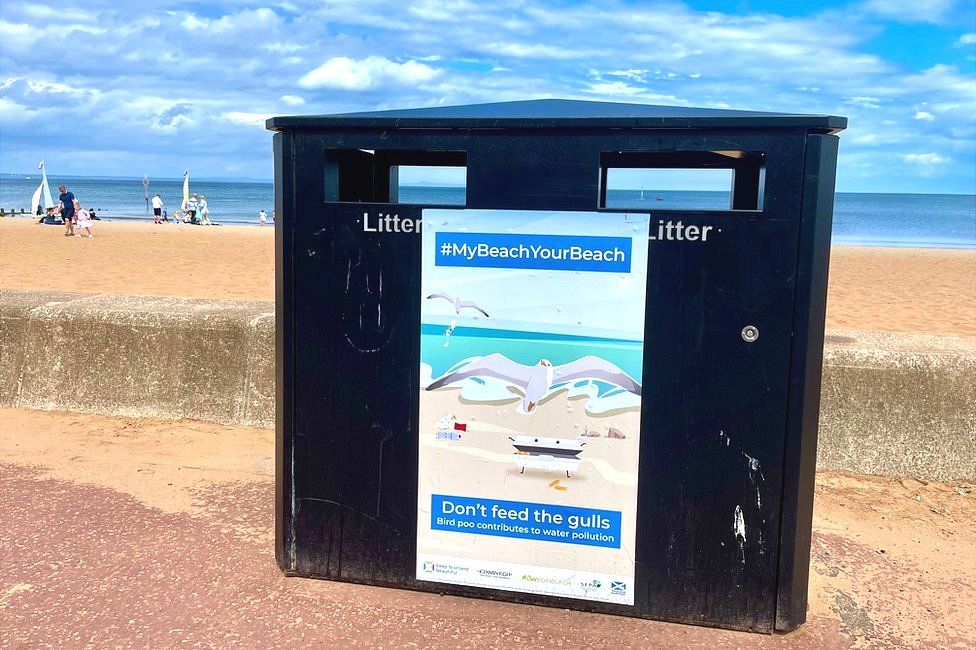ARTICLE AD BOX
By Angie Brown
BBC Scotland News

Signs at Portobello beach say "bird poo contributes to water pollution"
Posters warning people at Scottish beaches not to feed seagulls as "bird poo contributes to water pollution" have been challenged by ornithology experts.
The signs are part of Keep Scotland Beautiful's My Beach Your Beach campaign.
It said it targeted beaches "which face challenges with bathing water quality".
But RSPB Scotland and the British Trust for Ornithology said they did not support the message on the posters.
The signs have been posted along seven beaches at Ayr, Troon, Irvine, Saltcoats, Kinghorn, Portobello and Fisherrow.
Conservation charity RSPB Scotland told BBC Scotland seabird droppings, known as guano, were important sources of nutrients for marine life such as phytoplankton.
Image source, Getty Images
Image caption,The Bass Rock in the Firth of Forth is white due to gannet guano
An RSPB spokeswoman said herring gulls had declined by more than 50% since 1970 and were continuing to do badly along with other seabirds due to changes in natural food supplies.
She said: "Gulls need our help, or at least our tolerance, all the species breeding in the UK are of conservation concern with some in very serious trouble.
"Gulls have traditionally lived along our coastlines, we can help by learning to live alongside them."
She said guano contained phosphorus and nitrogen "which allow phytoplankton to grow, which feeds a variety of marine species, from snails to fish that humans eat".
She added that feeding gulls in urban environments, such as Portobello Beach, was not recommended as it could encourage gulls to beg, swoop for, or steal food from people.
Pretty innocuous
But she said the charity did not support the idea seabirds polluted seawater, as droppings were part of nature's cycle.
Portobello beach, where one of the posters features on a large litter bin, is on the Firth of Forth - the site of the world's biggest gannet population. The gannets have caused the Bass Rock at the site to turn white from all their bird poo.
Dr Viola Ross-Smith, of the British Trust for Ornithology, who has a PhD in gulls, told BBC Scotland she disputed the message on the posters.
"I would challenge this message," she said.
"Herring gulls are about a kilo and their poos aren't that big and are pretty innocuous, it doesn't compare to the amount of sewage and wet wipes that we put into the sea.
"We are the ones utterly affecting our environment, not seabirds."
Edinburgh sewage
Image source, alljengi/Wikipedia
Sewage treated by Scottish Water is discharged into the Firth of Forth estuary via pipes.
The Gardyloo boat was previously used to transport and release treated sewage into the Forth but that ended in 1998.
Seafield Waste Water Treatment Works is the largest works which discharges into the Firth of Forth, serving a population of about 800,000 properties.
It treats the equivalent of 120 Olympic sized swimming pools of waste water each day.
The waste is treated to a high standard through a series of processes during treatment before the final effluent is released back into the environment in accordance with Sepa regulations.
The My Beach Your Beach campaign has been running since 2018 and aims to raise awareness and encourage behaviour change among beach users.
Other posters in the campaign have advice on dog fouling, litter, feeding gulls, and disposing of fats, oils and greases
A Keep Scotland Beautiful spokeswoman said: "Gull and dog poo have been found to contribute to bathing water contamination and can affect bathing water classifications."
The charity's poster campaign has been endorsed by the Scottish government, City of Edinburgh Council and the Scottish Environment Protection Agency (Sepa).
Image source, Getty Images
Image caption,Keep Scotland Beautiful said gull and dog poo had been found to contribute to bathing water contamination
Mark Lewis, Scottish Ornithologists' Club birding and science officer, said he was surprised by the message on the posters.
He said: "It's a bit strange because seabirds will go to the toilet whether we feed them or not.
"Also at this time of year they are feeding their young so are more interested in finding natural gull food such as small prawns and crabs."
Sepa said microbial DNA source tracking at Portobello beach had found evidence of human, dog and gull sources impacting water quality.
A Scottish government spokesman said: "The bacteria that can cause poor water quality at designated bathing waters come from the stomachs of any warm-blooded animals including humans, livestock, gulls, dogs, and other wildfowl.
"Sepa monitoring has identified that at some bathing waters poor water quality is associated with gull and dog faeces."
Scott Arthur, City of Edinburgh Council's environment convener said: "We've been supporting the Keep Scotland Beautiful #mybeachyourbeach campaign for several years now and welcome any efforts to keep our beaches and bathing water clean.
"We also work collaboratively with Scottish Water and Sepa to reduce sewage spills on the coast and along our rivers."
Related Internet Links
The BBC is not responsible for the content of external sites.

 2 years ago
52
2 years ago
52








 English (US) ·
English (US) ·